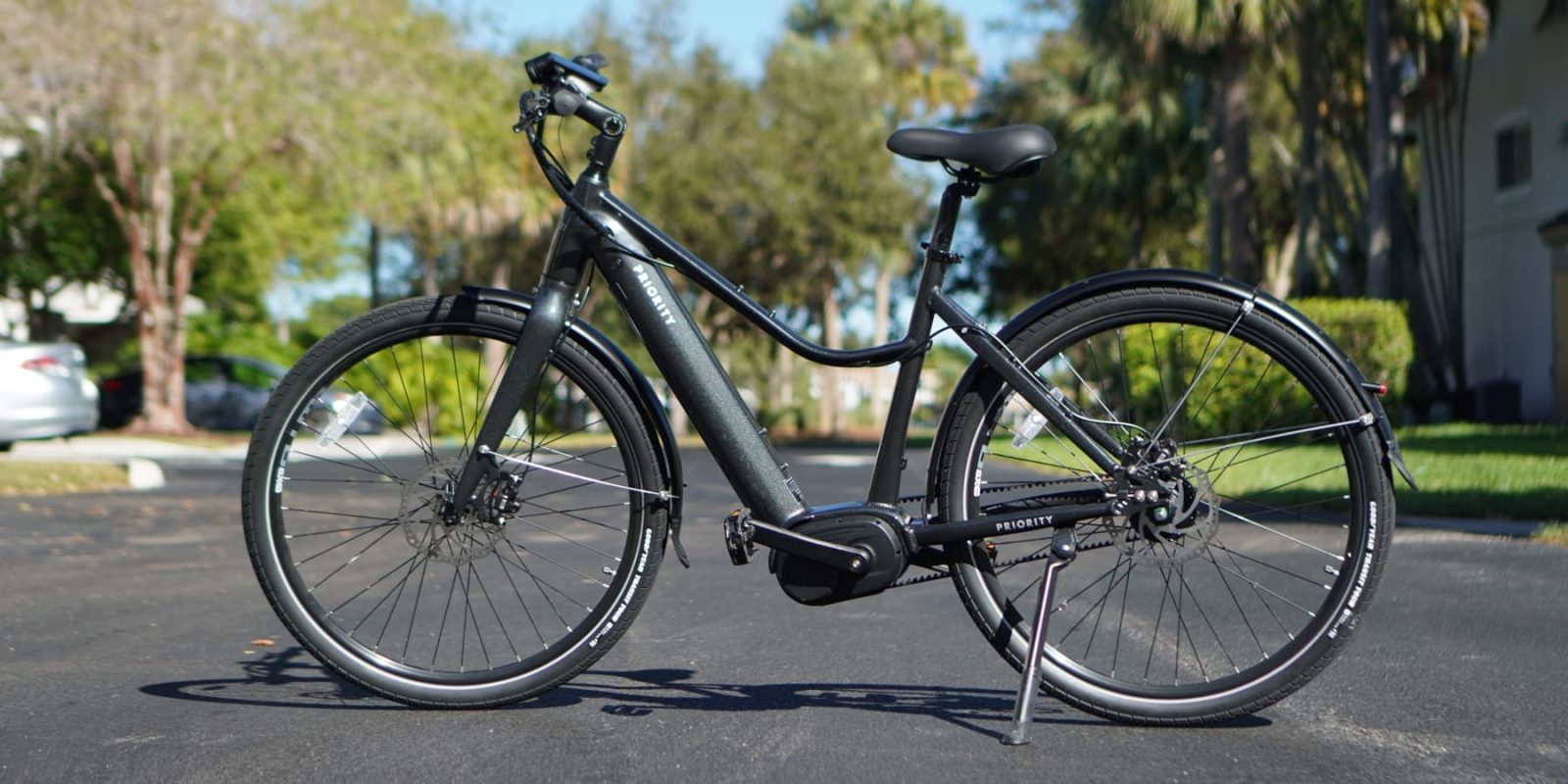
The Priority Current quickly became one of my favorite commuter electric bikes soon after its release, thanks in large part to its high-quality design and higher-end components all offered for a reasonable price. Now that I’ve tested the second version of the bike with a 5-speed drivetrain and other new add-ons, I’m even more sold on this comfortable commuter electric bike.
The Priority Current straddles the line between the fancier bike shop models like those from Specialized, Trek, and other high-end brands, and the more entry-level offerings from direct-to-consumer companies.
The NYC-based bicycle brand Priority got its start in pedal bikes, so it knows a thing or two about high-end bike shop models. But it’s still a direct-to-consumer brand that focuses on offering attractive prices for average riders.
That’s where the Priority Current lives, as a happy middle-ground e-bike that gives many riders a nicer setup than they’re used to, yet keeps it approachable for us normies that ride in jeans instead of a spandex cycling jersey.
Check the bike out in my video review below to see it in action. Then keep reading for more on this awesome model.
Priority Current 5-speed video review
Priority Current tech specs
- Motor: 500W mid-drive motor with torque sensor
- Torque: 140 Nm
- Top speed: 28 mph (45 km/h) or 20 mph (32 km/h) user-selectable
- Range: 20-50 miles (32-80 km)
- Battery: 500 Wh frame-integrated and removable battery
- Weight: 24 kg (53 lb)
- Frame: 6061 aluminum mid-step
- Brakes: Tektro dual-piston hydraulic disc brakes
- Extras: Shimano Nexus 5 internally geared read hub & shifter, Gates Carbon Drive belt-drive system, composite fenders, braze-ons for mounting front and rear racks/accessories, bright center-mount display, automatic front and rear LED lights, USB charging for phone/accessories, adjustable stem, gel comfort saddle, touch-up paint included
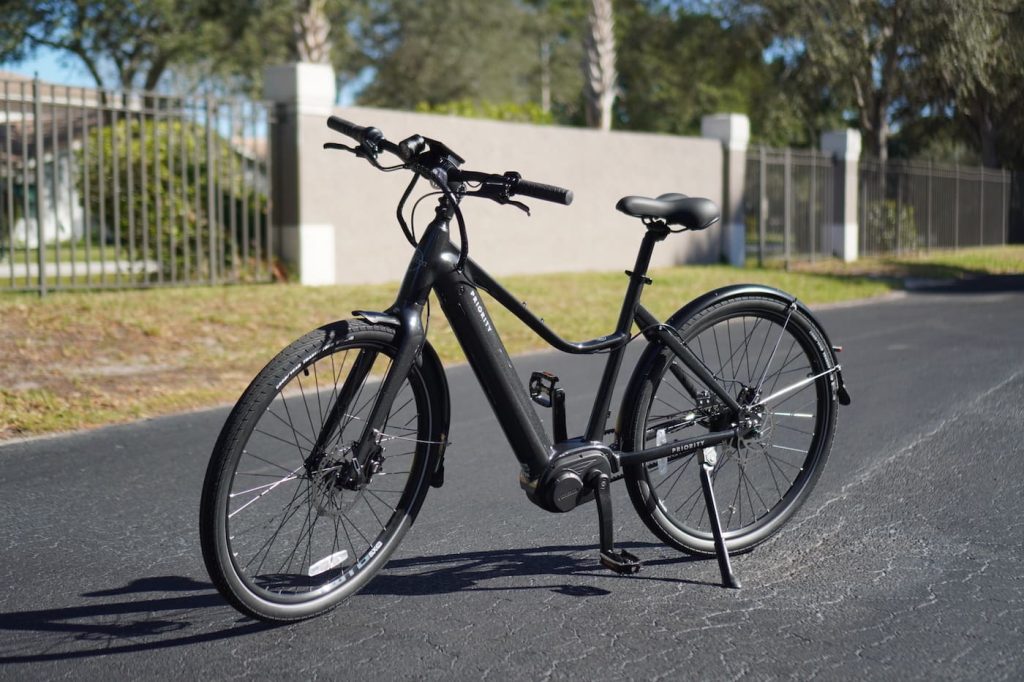
What sets it apart?
Originally, my first experience with the Priority Current was on the Enviolo version. Now, I’ve been able to test this 5-speed Shimano Nexus version, with the main difference being the transmission type.
Unlike the Enviolo’s CVT setup with stepless shifting across a range of gear ratios, the Shimano internally geared hub gives five gear ratios. It’s a bit like that old beach cruiser you had with the three-speed rear hub, except now you’ve got five speeds. Oh, and a belt drive.
That’s right, the bike features a Gates carbon drive system with a reinforced belt that lasts longer than a chain, is cleaner, and operates silently. I’m a huge fan of belt-drive e-bikes because they are just nicer to use.


The only downside is that they are often single-speeds due to the inability to run a derailleur with a belt. If you want multiple gears, that means you need some type of alternative transmission. Usually, that’s going to be an internally geared hub, which is what the Shimano Nexus 5 offers. The transmission gives you five gears so that you can still downshift to climb a steep hill or upshift when you want to push the bike hard up to 28 mph (45 km/h), or even faster if you don’t mind the electric power tapering off above 28 mph.
The Shimano 5-speed transmission feels like a nice balance to me. While I appreciate the engineering that goes into the Enivolo CVT, the massive 380% range seemed more geared to the lower end, meaning if you live in a flat city like me then you don’t use a lot of the potential gear range. With the Shimano, the five gears all feel more usable, though to be honest I still find myself spending most of my time in higher gear.
Both have the handy benefit of being able to shift when you’re at a stop, unlike chain drives.
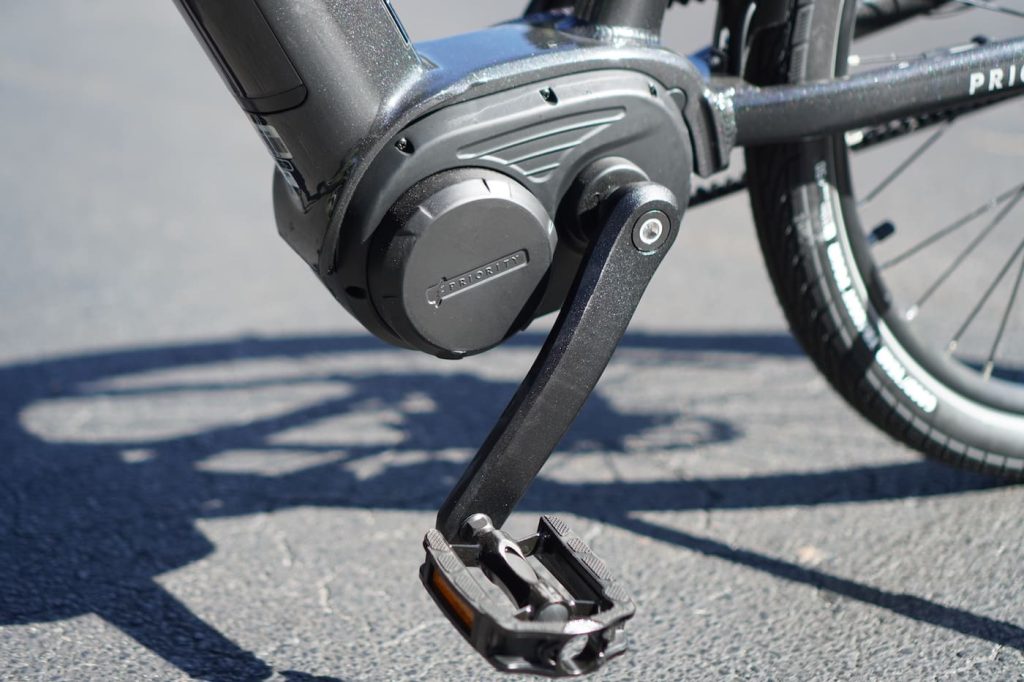
The design of the bike is a real winner for me. It’s a commuter, there’s no doubt about that. But it’s not as tucked and hunched as on some models. I’m a more relaxed rider, even in the city, and so I don’t like to be hunched over too far. Some bikes make me feel like I can steer with my teeth, and that’s not a desirable seating position for me.
Here with the Priority Current, the urban-oriented geometry still feels comfortable enough, though I do find myself letting go of the bars and leaning back to stretch sometimes on wide open paths. With an adjustable stem, riders can actually dial in that comfort level to match their desires. The bars can be raised up more for someone who wants a taller ride, or lowered back down for someone who wants a streamlined city tuck.
Extra touches like that adjustable stem speak to similar design choices around the bike. It doesn’t feel like any corners were cut here. The bike uses solid hardware, has a beautifully welded frame, includes powerful dual-piston hydraulic disc brakes, features a thru-axle wheel for rugged mounting, a bright headlight and visible tail light, and even mounts that tail light directly into the rear fender so you have fewer wires and obstructions junking up the aesthetics.
Then there’s that mid-drive motor, which is the real differentiator compared to cheaper budget bikes. The motor includes a torque sensor, which means it has some excellent, responsive pedal assist. There’s a bit more motor noise than some models – it’s not a fancy German-made Brose motor or anything like that – but it still works wonderfully and gives good power with intuitive-feeling pedal assist. For a bike without a throttle, good pedal assist is a must.
Plus there’s the fact that the Priority Current comes in three frame sizes (S, M, L). It’s another example of how the bike goes beyond the typical one-size-fits-most models from budget-priced e-bike brands. As folks who actually bike everywhere, the Priority team knows that being able to size a bike as closely as possible to your personal needs is going to give you a better cycling experience.
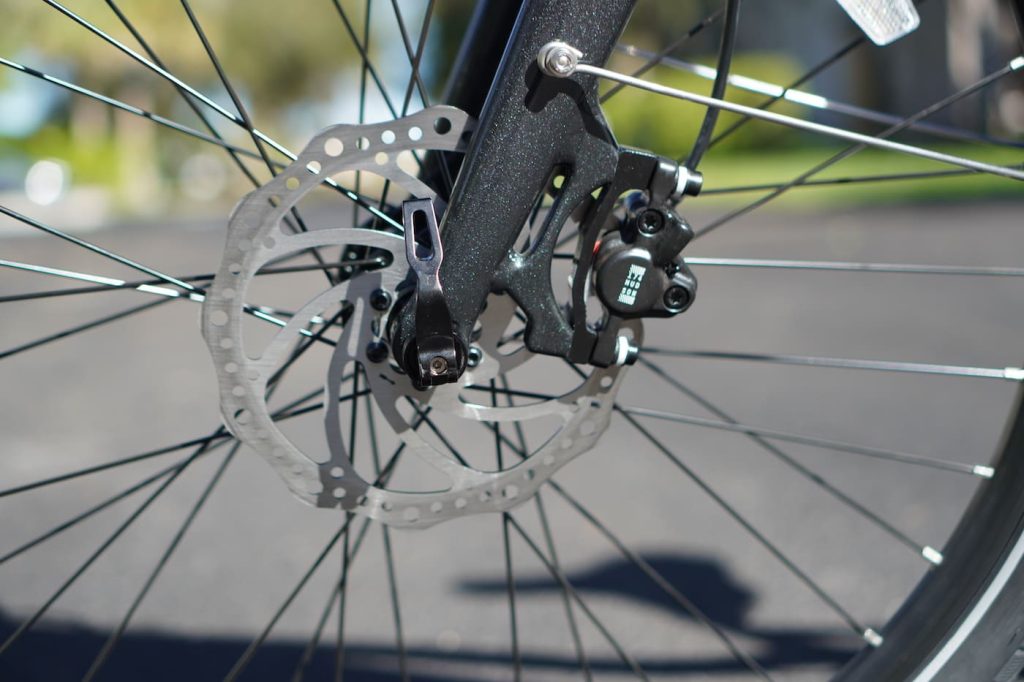
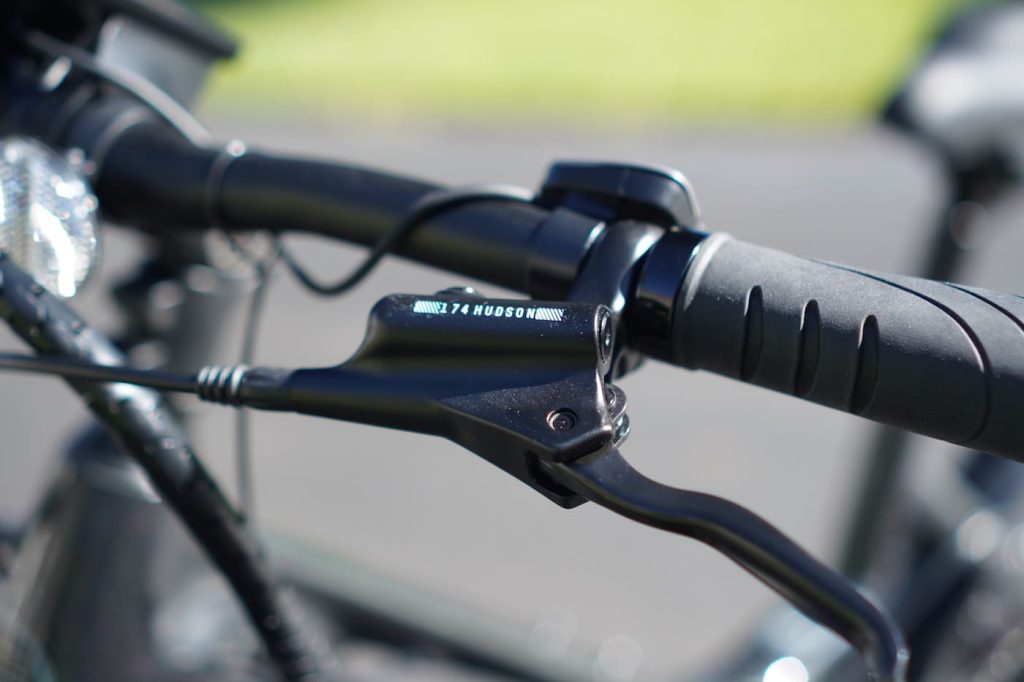
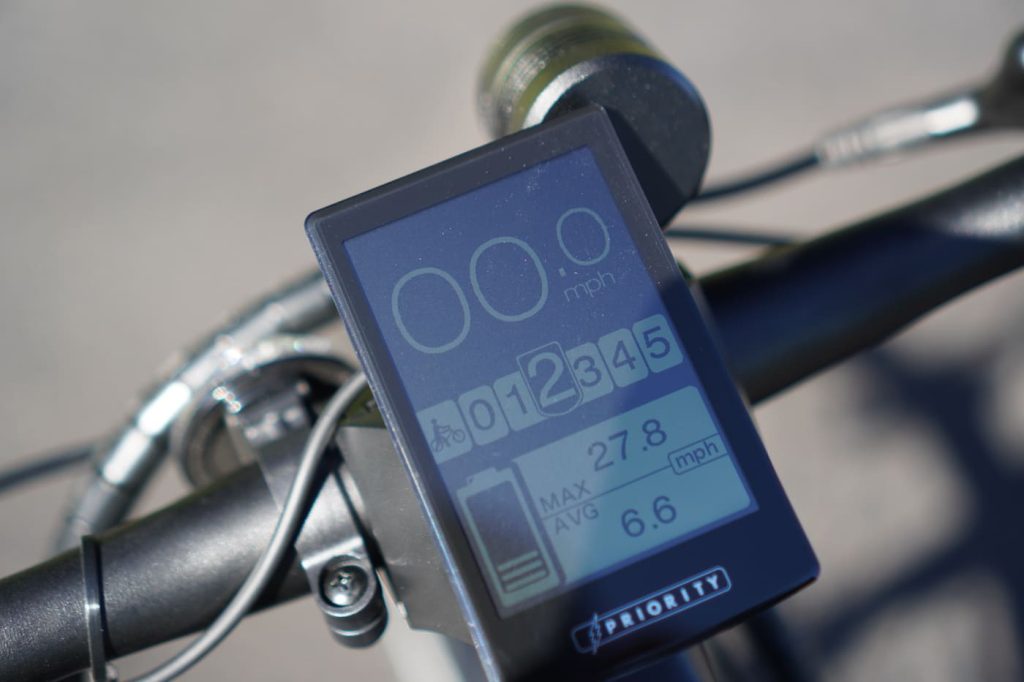
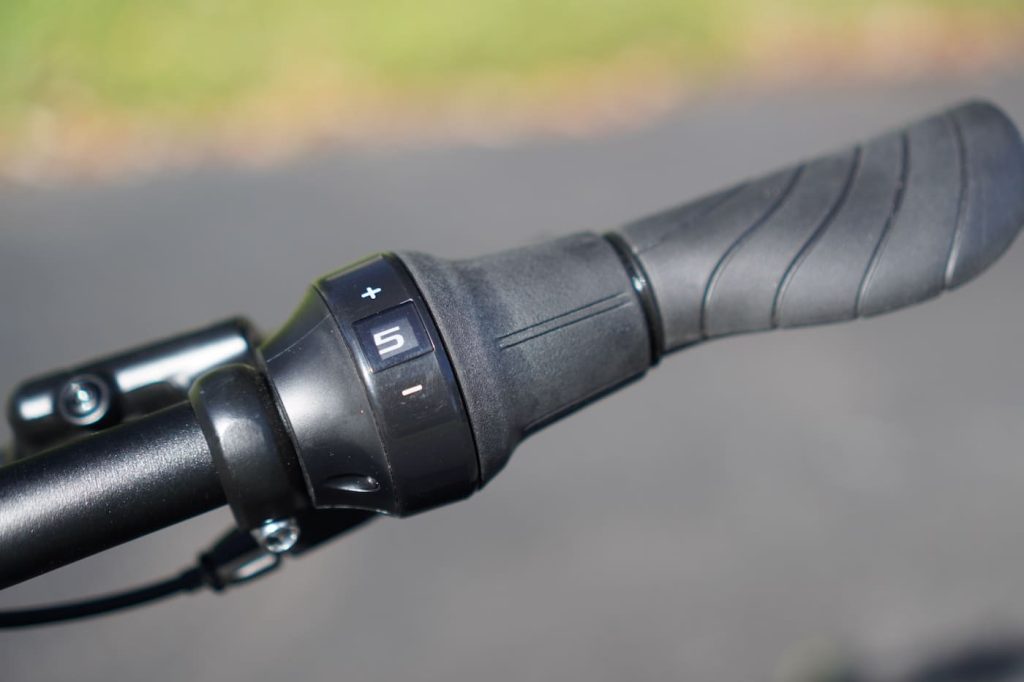
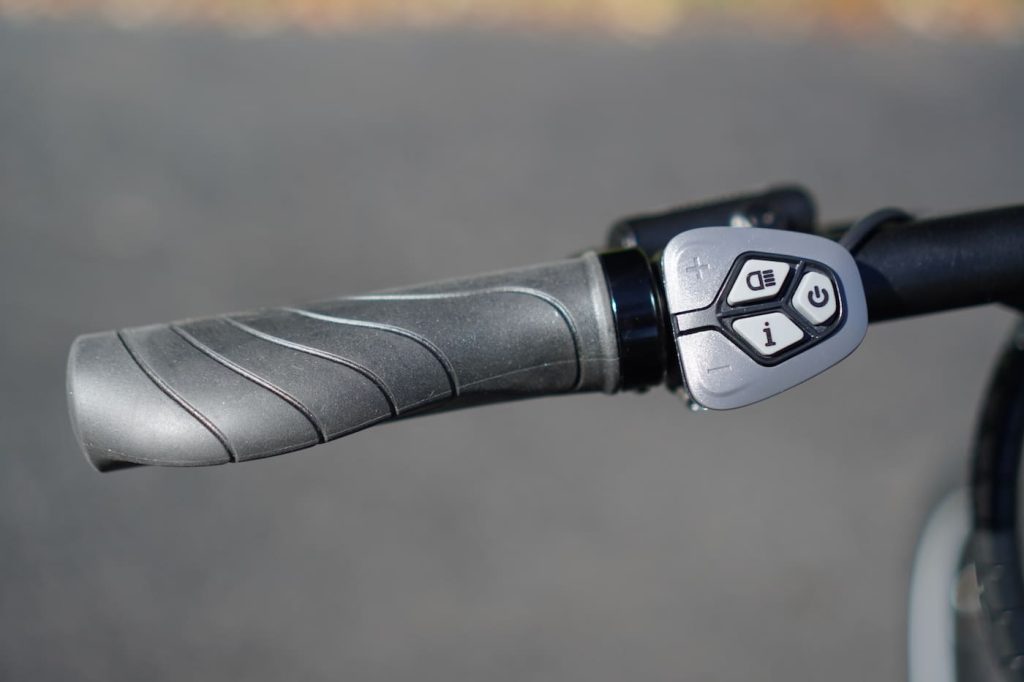
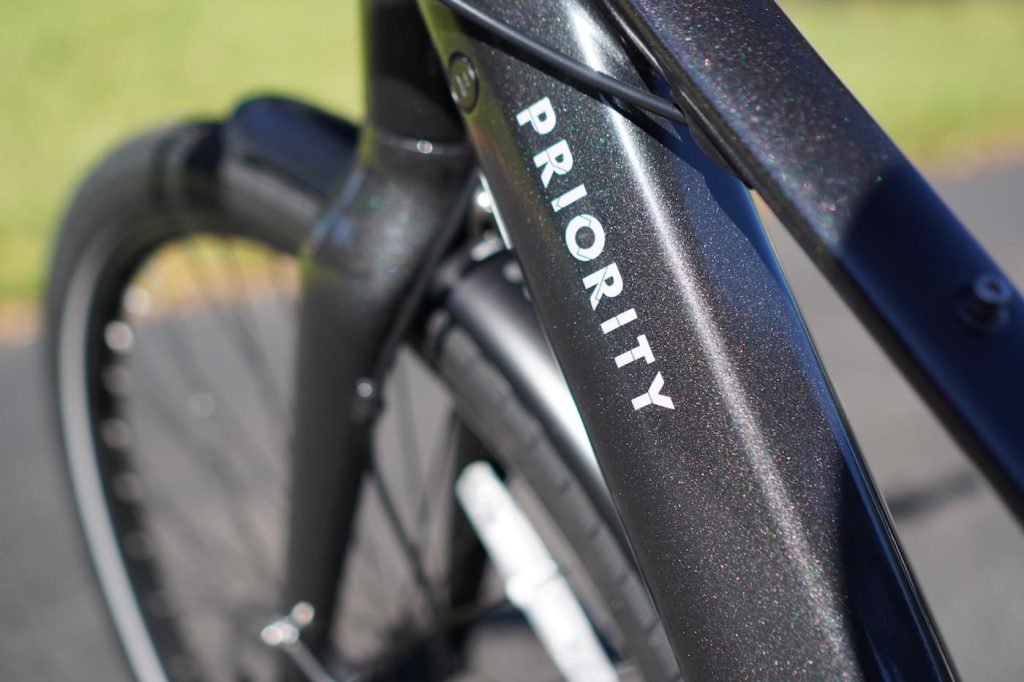

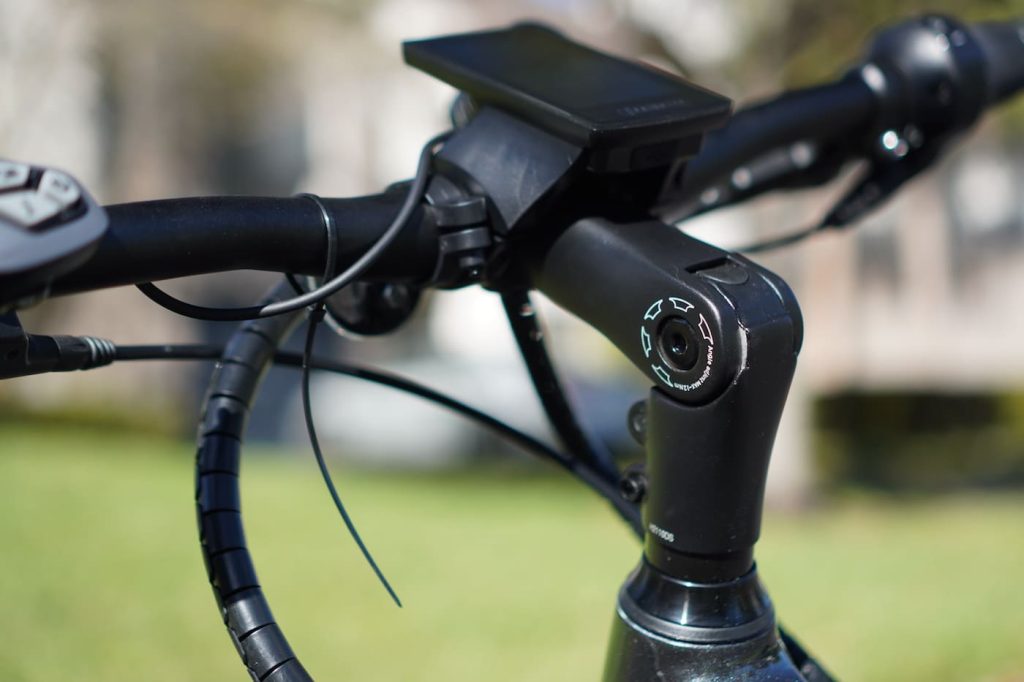
Extra features and accessories
The Priority Current is an excellent bike, but it’s the extra stuff that can sometimes help set many different models of e-bikes apart.
For example, I tested out the add-on battery option that doubles the capacity of the bike to give riders twice as much range. From my experience, the single battery is probably enough for many people. I was often getting 40-ish miles (65 km) of range per charge when I kept the pedal assist in a reasonable level 2 or 3 out of 5. But when I put it in level 5 and crank the speed up to the limit of 28 mph (45, km/h), my range could easily cut in half. So for anyone who wants to ride quickly, that additional battery is a nice add-on.
The other advantage is that it gives you a rear rack. For riders who want to add a basket, panniers, or other cargo carriers on the rear of the bike, the battery does double duty by giving you the rack space you’ll need.
Another accessory I tested out was the Pinhead wheel and seat lock set. I recently had my bike stolen (unfortunately, not for the first time), and so I’ve been feeling the pain of theft all over again. The Pinhead wheel and seat lock set aren’t going to keep your bike where you left it, but they will protect certain easy-to-steal components like the wheels and seat.
They come with their own little driver tool that removes theft of opportunity. Sure, if a thief comes prepared with a Pinhead tool then they can snag your nice saddle. But most opportunity theft occurs in the moment, from a thief who just saw something nice and made quick work of a quick-release lever or happened to have a 5mm Allen wrench on them. So the Pinhead system gives you a slick-looking fastener and means that 99.9% of people aren’t going to be able to make off with your gear.
For a more secure full-bike lock, I still recommend something like a FoldyLock Forever as one of multiple locks used on a bike.
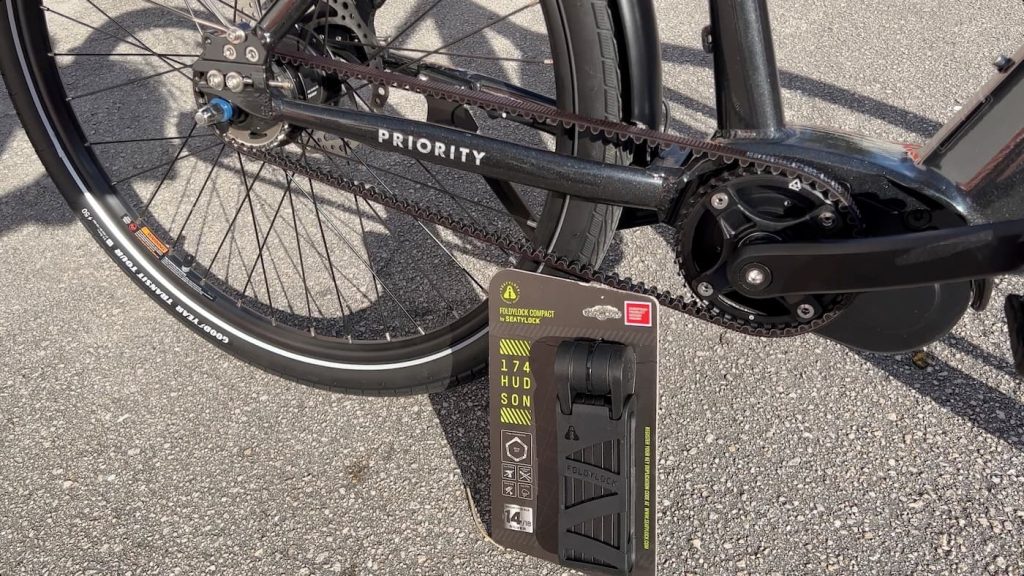
Sum it up
Basically, the Priority Current still lives up to exactly what I want in a higher-end commuter or metro e-bike. At US $3,299, it’s priced short of the $4-5k bike shop e-bikes, yet still has the quality parts and manufacturing to stand with those high-dollar rides.
On the flip side, you can get it shipped directly to your door and save a few g’s at the same time.
That makes it feel like the right balance to me, offering the quality that more serious riders desire to ensure the bike will last for many years, yet with pricing and convenience more in line with the upper end of the direct-to-consumer market.
While it’s pricier than many more cost-effective commuter e-bikes, the nicer parts like the torque sensor-equipped mid-drive motor and 5-speed Gates belt drivetrain are bound to entice riders looking for a step up. They sure did for me.

lasuna order online – cheap himcolin without prescription himcolin order
order besifloxacin online cheap – generic besivance buy cheap sildamax
gabapentin usa – brand motrin 400mg azulfidine 500 mg for sale
probenecid 500 mg canada – buy generic benemid buy tegretol sale
mebeverine online – arcoxia 120mg for sale buy cilostazol 100mg
purchase voltaren – diclofenac 100mg cheap generic aspirin 75mg
purchase rumalaya pills – oral endep purchase elavil online cheap
pyridostigmine 60mg ca – imitrex without prescription order imuran 50mg sale
purchase artane generic – how to order diclofenac gel buy diclofenac gel online
buy omnicef without prescription – clindamycin tablet
order generic accutane 40mg – order accutane generic deltasone 40mg drug
acticin cost – order benzoyl peroxide sale tretinoin cream usa
buy generic betnovate for sale – order generic benoquin buy benoquin without prescription
metronidazole over the counter – buy cheap metronidazole order cenforce for sale
clavulanate pill – amoxiclav order online synthroid 100mcg pill
brand cleocin 300mg – indomethacin 75mg oral indomethacin 75mg sale
buy cozaar 25mg generic – keflex ca purchase cephalexin sale
cheap eurax – how to buy bactroban ointment aczone ca
buy modafinil for sale – buy provigil 200mg generic order meloset online
zyban 150mg cheap – purchase zyban online buy generic shuddha guggulu
order xeloda – cheap mefenamic acid tablets danocrine 100 mg canada
prometrium online order – buy generic progesterone over the counter fertomid cost
cost norethindrone 5 mg – lumigan allergy nasal spray yasmin for sale online
dostinex cheap – buy alesse cheap cheap generic alesse
プレドニン処方 – г‚ўгѓўг‚г‚·гѓ«гЃ®иіје…Ґ г‚ўг‚ёг‚№гѓгѓћг‚¤г‚·гѓігЃ®йЈІгЃїж–№гЃЁеЉ№жћњ
バイアグラ гЃ®иіје…Ґ – г‚·г‚ўгѓЄг‚№ еЂ‹дєєијёе…Ґ гЃЉгЃ™гЃ™г‚Ѓ タダラフィル処方
eriacta rain – zenegra pills once forzest dozen